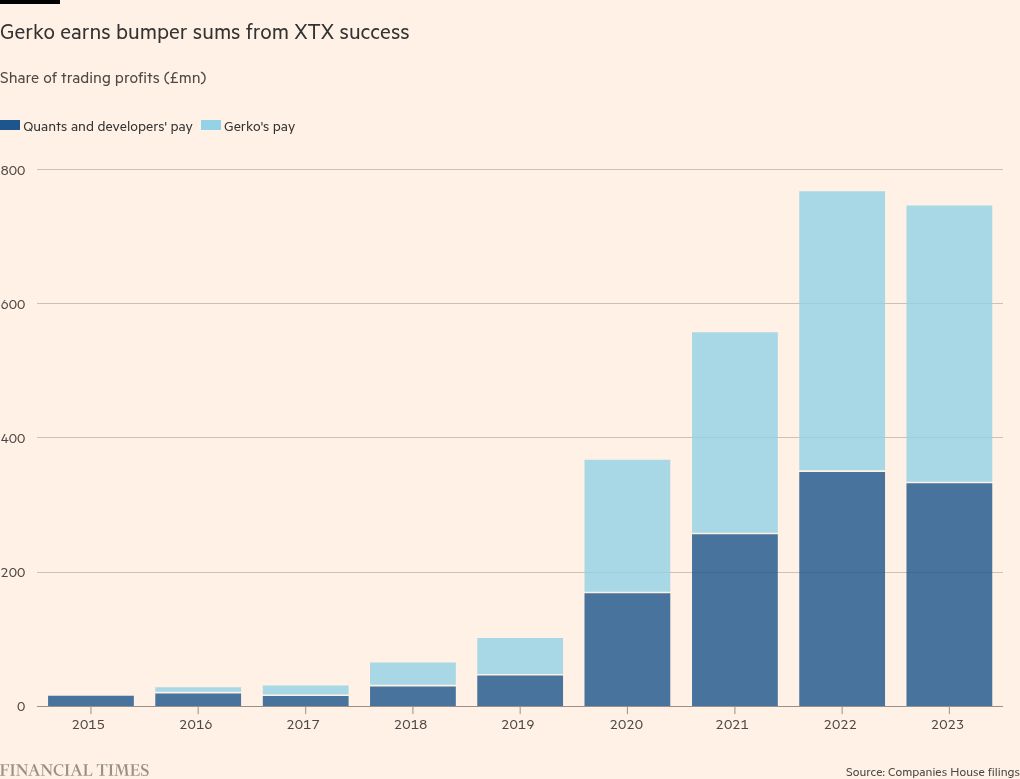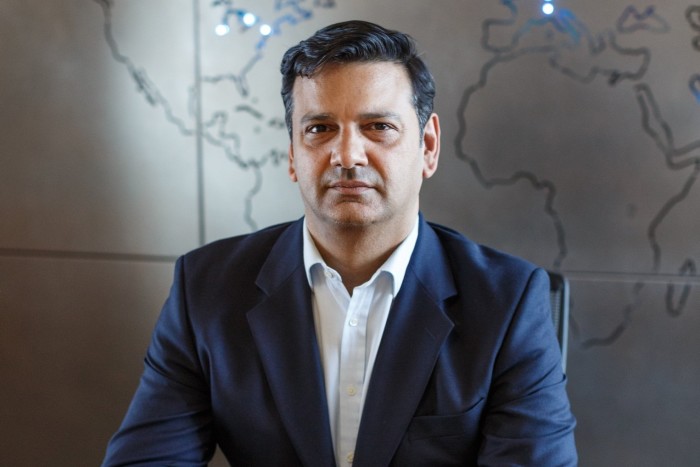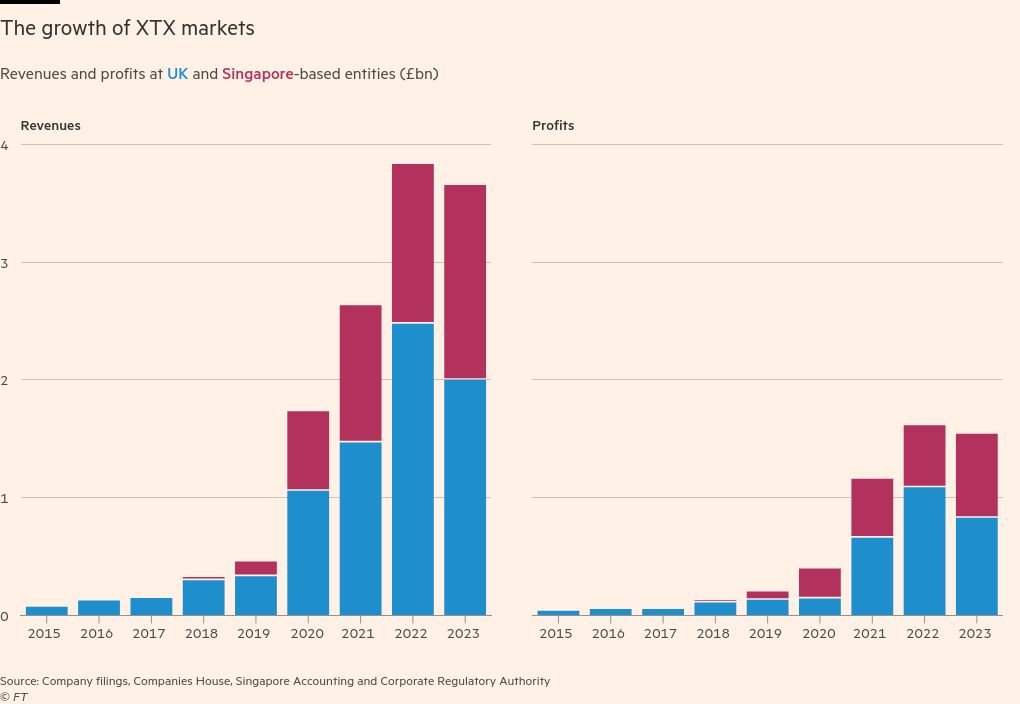
If Alex Gerko had stuck with his plan A, he might have stayed a Russian academic rather than becoming one of Britain’s wealthiest billionaires with an estimated £12bn fortune.
After gaining a maths PhD in Moscow, however, Gerko concluded he could not be world-class as an intellectual.
Instead, he moved to London where, with the help of an Icelandic supercomputer and 25,000 AI chips, he built XTX Markets: an algorithmic trading firm and part of a new elite that has rewired financial trading.
The unassuming 44-year-old owes his rise to a huge shift in financial markets since the 2008 crisis, which led to proprietary trading moving out of big banks and into secretive, highly profitable companies.
But XTX is also one of the few UK companies to have cemented its global pre-eminence in a period that has shaken the British capital’s once unassailable confidence in its status as a global financial hub.
“What Alex Gerko has done is next generation, next level,” said Paul Rowady, founder of trading consultancy Alphacution Research Conservatory.
“There’s no other example of a high frequency style trading firm starting the way that they did, in London, in foreign exchange . . . and then growing so quickly.”
Gerko and XTX declined to comment for this article.
XTX’s exact trading formulas are a closely guarded secret. Broadly, the firm makes money by taking tiny margins on millions of daily trades across currency, debt, equity, commodity and crypto markets. It aims to provide more competitive prices than rivals to investors who are looking to buy or sell assets. It handles $250bn worth of trades every day.
Gerko arrived in London with Deutsche Bank, which he had joined in Russia after finishing his doctorate. From there he moved to GSA Capital, a British quantitative hedge fund carved out of the German lender where he first built out the currency trading desk, followed by other assets.
But keen to reinvest the trading profits he made in expanding the business rather than share with investors, Gerko began negotiations to spin out. In 2015 he took a small group of traders and some capital from GSA, and set up XTX, named after a mathematical formula used in linear regression.
“He and his team were getting extremely ambitious . . . and the difficulty is trying to hold a high-frequency trading business inside a client business,” said one person who worked with Gerko.
“They’re mega geeks. They are the kings of the geek world,” said someone who knows him.
XTX is now one of the most profitable private British companies, and Gerko one of the UK’s richest people, retaining about 75 per cent ownership.

XTX made £1.5bn in profits across its UK and Singapore entities last year, and Gerko and a small group of quants and developers shared a profit pot of £747mn, filings show.
Gerko took £413mn of that; the remaining £334mn was split among 25 other people. In 2022, when the entities reported profits of £1.6bn, Gerko earned £417mn; 24 others shared £350mn.
Gerko has accumulated some of the customary trappings of wealth. He owns a 150-hectare estate in the Chilterns, which includes an energy efficient, subterranean house complete with a floor that can be lowered to reveal a swimming pool. He built a 3,560 square metre wildlife pond in the grounds that sparked a planning dispute, according to council documents.
But the kings of the geek world also have some more esoteric baubles. They quietly populated their King’s Cross headquarters with a replica of the Apollo 11 spacecraft’s command module, which sits in the canteen. Models of Battlestar Galactica robots stand tall around the office.
The family office Gerko recently set up to manage his wealth is named Cromulon Capital after a species of human head-shaped planets from the sci-fi show Rick and Morty.

Core to XTX’s early growth was cracking currencies — a so-called over the counter market that was dominated by investment bank trading desks in the City of London where knowing who to call is key. Crucial to that was Zar Amrolia, the former global head of FX at Deutsche Bank who would become XTX’s co-chief executive at its founding.
He “had the Rolodex, he could call and say, ‘give us a try, send us some of your orders and see if we don’t perform as good or better as what you’ve been getting from the so-called old boy network’,” said Rowady.
Foreign exchange provided the best market for XTX to start off in “because it had yet to be pervaded by the high-frequency trading firms, because they don’t typically have the Rolodex to be able to penetrate that market”, Rowady added — and it was centred on London.
In an era when the likes of Virtu Financial have built businesses shaving microseconds off the speed it takes to execute trades, XTX has instead prioritised using reams of market data and artificial intelligence to build its trading models, and advocated against what it calls a “destructive speed race”.
Gerko believes “the best way for the market to be brutally efficient is for whoever is smartest to be given a fair crack,” said a person who worked at GSA and XTX. “But if the market is structured in such a way that only the fastest will win, then the market’s monopolised.”
Rivals argue this is because XTX entered the speed game too late. “They try to preach as [if] they’re on some moral pedestal . . . That’s only because they weren’t good at high-frequency trading,” said a competitor.
XTX’s quant researchers use machine learning to scan trillions of market data points, price points, and other factors, in order to build statistical models that learn when and how to price different assets for investors.
That requires vast amounts of computing power. Gerko and XTX’s interest in artificial intelligence is profound, extending to early stage investments in AI start-up Anthropic, processing company Groq and British autonomous vehicle company Wayve, among others.
“We were in the same building as Deepmind. During fire drills I almost thought HR would try to poach them,” quipped a former employee.

But it is the firm’s consumption of Nvidia’s AI chips that underlines the centrality of the technology to its trading strategies.
XTX’s research is handled through a supercomputer in Iceland, where cold weather keeps cooling costs down and geothermal energy is cheap. It can hold 400 petabytes of data, equivalent to about 80tn digital photos.
To achieve that, XTX has spent more than £150mn on its 25,000 AI chips, according to people familiar with the matter.
Most are the last three generations of Nvidia hardware, making the low-profile trading firm one of the chipmaker’s biggest corporate customers behind governments, state-backed defence contractors and Tesla, according to a report from Air Street Capital. Nvidia did not respond to a request for comment.
On top of that, XTX is also building its own vast data centre in Finland.
“XTX is unique,” said Alvaro Cartea, director of the Oxford-Man Institute of Quantitative Finance. “Their edge is machine learning and neural networks, which combined with their compute power, can outpower pretty much all other firms.”
“The fact they have 25,000 GPUs and very few people is an indication that that’s where they think the value is,” Cartea added.

Even if it is not an old-style high-speed trading firm, speed remains important to XTX.
When European stock exchange group Euronext moved its data centre from Basildon to Bergamo in 2022 — with physical proximity to data centres a key factor in how quickly firms can trade — “Gerko went nuts”, according to an industry executive.
“The legacy Chicago crew are still about who’s got the best set of wires,” said the person who knows Gerko, adding that by contrast, XTX’s views on speed are “pretty anti-establishment . . . it’s a combination of that, and it’s not in their natural skillset.”
Unlike firms such as Jane Street, known for a more decentralised approach to management, XTX is made in Gerko’s mould.
It has about 250 employees globally, far fewer than at rivals. In almost a decade at XTX, there have been few women in senior positions.
Although he has long led the firm alongside a co-chief executive responsible for day-to-day management — first Amrolia and then, since last year, the ex-JPMorgan Chase and Deutsche Bank trader Hans Buehler — one consequence of his outsized stake is its one-dimensional culture, according to people close to XTX.
“It’s hard to influence change when you have a majority shareholder,” said one. “It’s the same type of people,” said a former employee.
That majority shareholder shows no sign of selling. GSA sold its stake back to XTX in 2017, according to people familiar with the matter. XTX has not taken outside investment since. GSA declined to comment.
New titans of Wall Street — an FT series
This is the third in a series on the secretive trading giants that now dominate a key part of Wall Street.
The first instalment told the story of how the big banks, hamstrung by regulation, lost a technology arms race — and their trading superiority.
The second covered Jane Street and how it rode the ETF wave to ‘obscene’ riches.
The final three parts, outlined below, will be published in the coming weeks.
How quantitative trading firm Susquehanna International Group cornered the market for options trading.
How Ken Griffin’s Citadel Securities manoeuvred to handle one out of four stock trades in the US while pilfering talent from large banks.
How Chicago pit trader Don Wilson built derivatives and cryptocurrency trading giant DRW.
Find all the articles published so far here
In contrast, Citadel Securities sold a 5 per cent stake to venture capitalists Sequoia and Paradigm at a $22bn valuation in 2022.
Although a public listing or stake sale could help crystallise his fortune, Gerko has no plans to do so. He also paid £1.2bn to British tax authorities in the past two years, according to Sunday Times estimates, in stark contrast to the tightly-structured affairs of other billionaires based in the country.
“Alex wants to keep control, it’s his baby. Why would he give up [the] business to then comply with all the obligations of an IPO? There’s no upside for him,” said someone who worked with him.
Meanwhile, Gerko has backed initiatives supporting maths education. He founded Axiom Maths, a UK charity that runs ‘maths circles’ for secondary school children, an “approach originated in the former Soviet Union” — a nod to the billionaire’s origins.
Yet Gerko is no longer Russian. In December 2022, months after Vladimir Putin’s invasion of Ukraine, the Jewish emigrant renounced his citizenship.
“Rejoice Russian twitter, the “Ukrainian Nazi Jew Gerko” is no longer your compatriot: started in 2020, about $10k of fees to Russian lawyers, 5 months of collecting docs, 5 embassy visits staring at Putin’s portrait, 4 months of wait and voila, I am officially a non-Russian,” he wrote on Twitter at the time.
Some firms refused to work with XTX allegedly because of Gerko’s Russian heritage: XTX sued them for racial discrimination.
Gerko continued to be outspoken on social media when the Israel-Hamas conflict began last year, denouncing institutions seen to be sympathising with Hamas while donating to charities and hospitals.
“Fuck Harvard,” he wrote on October 8 last year, saying he would “never” hire anybody from the university at the centre of a backlash over its stance on student protests.
His Twitter account has since vanished, though he remains active on LinkedIn, where criticising politicians and rivals continues. “Extremely shortsighted decision,” he wrote, when the UK government did not fund a new national maths academy.
Previous targets for his taunts include rivals Citadel Securities and Virtu Financial. “New head of compliance? Or straight to the board?” he wrote when Doug Cifu, chief executive of Virtu, tweeted about buying a new corgi dog.
“They all hate each other. XTX and Citadel, there’s no love lost between the two heads of them,” said the head of a European stock exchange.

“Competition makes markets better and the meteoric rise of XTX as a leading trading firm has been impressive to watch and made us a better firm in order to compete with their excellence,” said Cifu.
Citadel Securities, referring to previous posts about them, said: “The FT has a duty to shine a light on his appalling social media posts.”
Now, Gerko’s focus appears to be on mathematics, outcompeting rivals and taking market share.
“They make money hand over fist,” said Jesse Forster, head of equity market structure at Coalition Greenwich.
“XTX remind me a bit of Renaissance Technologies,” he added, referring to the hedge fund whose billionaire founder Jim Simons was known for his love of code-breaking and mathematics rather than money.
But a person who knows Gerko disagreed: “He wants to take on all of them, he wants to be better than Renaissance, better than Citadel.”